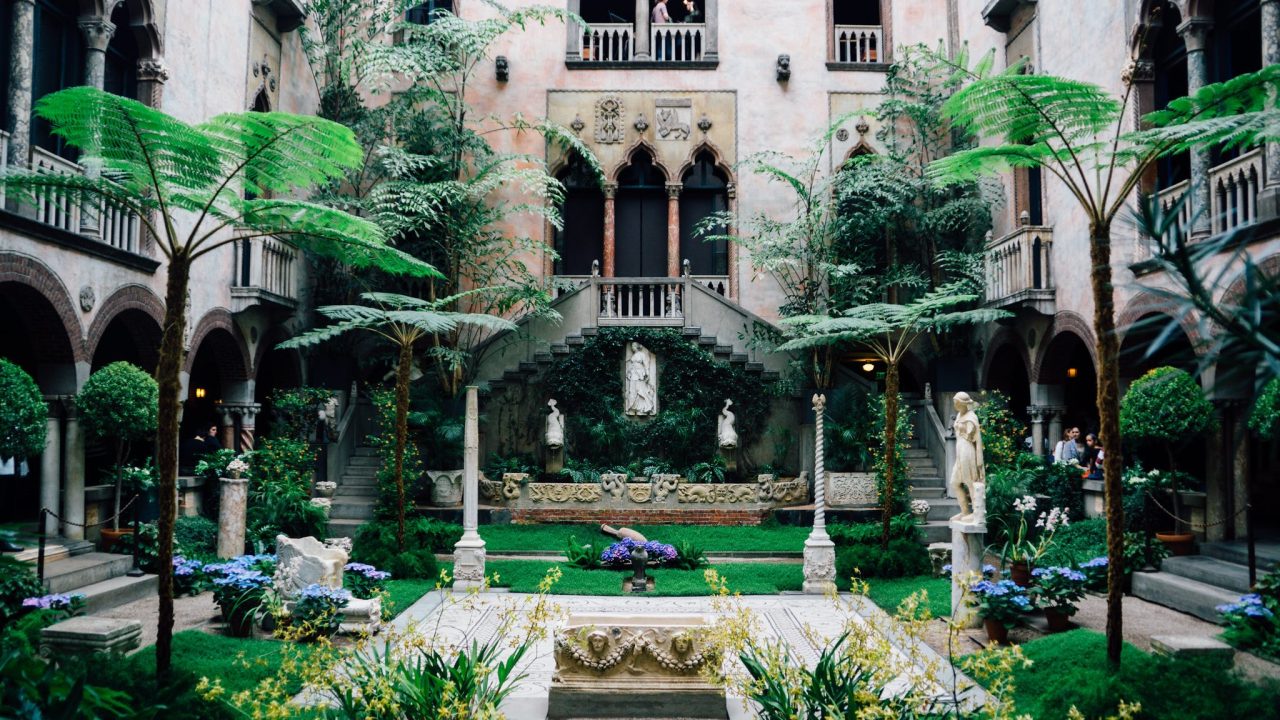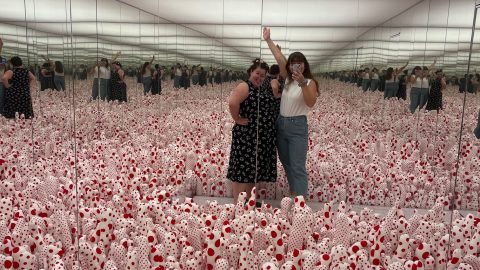
Gardens can be artful, historic, and scientific—beautiful, educational, and ecological all at once. So they tend to go hand in hand with museums, uniting much of the diverse subject matter our field encompasses. Some museums are gardens, and many more operate gardens of some kind. From sprawling outdoor grounds, to serene sculpture parks, to lush rooftop oases, our institutions spoil visitors for choice with opportunities to contemplate among the flowers (or succulents, or rocks, or monumental sculptures…).
With spring upon the Northern Hemisphere and its trees and shrubs abloom, we thought we’d ask our Field Notes subscribers to share the inside scoop on their favorite museum gardens, as they previously did for cafés, bathrooms, and stores. (Subscribe now to join the next poll!) Here were the ones they mentioned most often across hundreds of responses.
The Courtyard at the Isabella Stewart Gardner Museum (Boston, MA)
Recommended by Kate Nardin, Ryan Beckman, Lizette Gradén, Elizabeth Wiecher Pierce, Tammi Edwards, Kristin Crawford, Monica Gomez, T.C. Steele State Historic Site, Maddie Mott-Ricci, Christine Melville Harvey, Margaret Isham, Jen Kretser, Karrie Porter, Sean Blinn, Catherine Caverly Taraviras, Lisa Sheley, Hailey Conneely, Eric L. Mundell, Ann Barnard Toftness, Ruaidhrí Belfry Crofton, Gavin Culbertson, Meg Donaldson Carson, Fabiana Chiu, Del Baker Robertson, Sarah Gretchen Titus, North Andover Historical Society, and Amy Littlewood Frasco
View this post on Instagram
The beloved central space of this idiosyncratic Boston museum manages to be both a perennial and a seasonal delight. Thanks to dedicated horticulture staff working mostly out of a temperature-controlled nursery, the Courtyard boasts blooms year-round, with almost-monthly rotating displays in categories like orchids, chrysanthemums, and nasturtiums.
The Huntington Botanical Gardens (San Marino, CA)
Recommended by Leah Melber, Alyssa Cordova, Karen Graham Wade, Kathy Arnold, Elizabeth Wiecher Pierce, Sylvia Bruner, Joseph Kolasinski, Catherine McCarthy, Akeia de BarrosGomes, Sunny Spicer, Kelli Walsh, Mar AceMehia, Sarah Jane Cox, L.E. Brown, Eric L. Mundell, Holly Deakyne, Julie Steiner, and Martin Fox
View this post on Instagram
Stretching over about 130 acres, the Huntington Botanical Gardens feature eighty-three thousand living plants between sixteen themed gardens, including a Jungle Garden, Chinese Garden, Shakespeare Garden, and Palm Garden. The Huntington also operates a laboratory for botanical conservation and research.
Desert Botanical Garden (Phoenix, AZ)
Recommended by Kim Baker Nickels, Cheryl Thornhill, Angela Watts, Joseph Kolasinski, Karrie Porter, Rox Adams, Kathy Wells Clark, Jen Kretser, Sean Blinn, Sharol Buck, Gavin Culbertson, Melissa Kershaw, Catherine McCarty, Patricia Ann Raynor, and Martin Fox
View this post on Instagram
“Think the desert is all dirt and tumbleweeds? Think again,” declares this Arizona institution. Throughout more than fifty thousand displays of cacti, trees, and flowers across 140 acres, the Desert Botanical Garden proves the beauty of desert plants rivals any others’.
Storm King Art Center (New Windsor, NY)
Recommended by Hassan Najjar, Catherine Bergmann, Sarah Braverman, Molly Phillips, Kathy Greif, Joan Lessing, Jennifer Rubin Garey, Renée Compagna, Melanie Fraticelli-Twardzicki, Sean Blinn, Catherine Caverly Taraviras, Gavin Culbertson, Eileen Gill, and Holly Deakyne
View this post on Instagram
This sweeping open-air museum in New York’s Hudson Valley is a premier destination for taking in both natural and artistic beauty. Visitors can stroll through five hundred acres of open landscape while viewing a world-renowned collection of large-scale sculpture and site-specific artworks.
Missouri Botanical Garden (St. Louis, MO)
Recommended by Makenzee Brown, Renée Compagna, Rod Williamson, L.E. Brown, Ann Barnard Toftness, Gavin Culbertson, Catherine McCarthy, and Chris G. Carron
View this post on Instagram
Founded in 1859, this St. Louis institution can proudly call itself the oldest continuously operating botanical garden in the country. Major features include a geodesic dome conservatory, a fourteen-acre Japanese strolling garden, and an interactive children’s garden experience that teaches the significance of nature and plants.
The Gardens of The Met Cloisters (New York, NY)
Recommended by Heba Khairy, Dana Golan Miller, Jennifer Lawton Schloat, India Rael, Holly Deakyne, and Katherine Danalakis
View this post on Instagram
With three unique gardens and an orchard, the Metropolitan Museum of Art’s branch museum is as much a showcase for the plants of medieval Europe as its art and architecture. Each design reflects thorough research into historical sources: the orchard and Judy Black Garden in the Cuxa Cloister mimic the design of aristocratic pleasure gardens, the Bonnefont Cloister Herb Garden showcases the known uses of more than four hundred species in the Middle Ages, and the Trie Cloister Garden riffs on the “ecstatic” fantasy gardens described in the art and literature of the period.
Winterthur Garden (Winterthur, DE)
Recommended by Robin Sarratt, Brenda Hornsby Heindl, Cheryl-Lynn May, Julie Steiner, and Danyelle Rickard
View this post on Instagram
In addition to a museum and library, the Winterthur estate in Delaware maintains the historic garden designed by founder Henry Francis du Pont. His naturalistic design is particularly regarded for its “lyrical” color combinations, the result of decades of experimentation with thousands of different plants.
Philbrook Gardens (Tulsa, OK)
Recommended by Melody Lowe, L.E. Brown, Joseph Kolasinski, Ulrich Museum of Art, and Ruaidhrí Belfry Crofton
View this post on Instagram
The gardens outside of this Oklahoma art museum reflect its building’s past life as “Villa Philbrook,” the home of a local oil tycoon modeled on an Italian Renaissance villa. In addition to the home’s original formal gardens, which take their structure from sixteenth-century models, the museum also maintains a modern sensory garden design conceived in 2004. The Philbrook also houses a beloved garden cat, Cleome, who serves double duty as pest control and visitor-experience-booster.
Honorable Mentions
- Rooftop courtyard at the Museum of Jurassic Technology (Culver City, CA) – Recommended by Kate Nardin, Emily Lytle-Painter, Mar AceMehia, and Holly Deakyne
- New England Botanic Garden at Tower Hill (Boylston, MA) – Recommended by Ryan Beckman, Ali Kane, Amy Littlewood Frasco, and Diana West
- Gardens at Biltmore (Asheville, NC) – Recommended by Christal Tongish, Meghan Ward, Joan Lessing, and Karrie Porter
- Donald J. Hall Sculpture Park at the Nelson-Atkins Museum of Art (Kansas City, MO) – Recommended by Alex Whitney, Angela Watts, Karrie Porter, and Anne Manning
- Mary Livingston Ripley Garden (Washington, DC) – Recommended by Meredith Peruzzi, Betsy Smith Platt, Tania Said, and Patricia Ann Raynor
- deCordova Sculpture Park (Lincoln, MA) – Recommended by Amy Littlewood Frasco, North Andover Historical Society, Lauren Kaufmann, and Martin Fox









I recommend the Lagoon and gardens at the cleveland Museum of Art. A gem in bloom in the cultural heart of Cleveland known as University Circle. The cleveland Museum of Natural History is right next door as well.
We are currently thinking of creating a native plant garden at our little museum, so this article is an excellent help.
We have 2 notable gardens in my area: the Paine Art Center and Gardens (https://www.thepaine.org/gardens/) in Oshkosh, WI and the Green Bay Botanical Garden (https://www.gbbg.org/). I just looked at the website for the Paine, and the pictures do not do it justice. Now, it’s not on par with the the “Best” from the article as far as size, but it’s appropriate for the estate and it’s extremely well-researched and well-maintained. I’d also like to mention the small but integral heirloom garden at the Chesapeake Bay Maritime Museum in St. Michaels, MD. 4 raised beds, each representing a century in the history of the Eastern Shore and what would have been grown then–mostly vegetables, but also some flowers. Again, very well-researched, and it’s planted and maintained by master gardeners. And people can eat what comes out of it!
I would certainly check out Vizcaya Museum and Gardens. Incredible unique adaptation of European Gardens in a tropical setting…
I would highly recommend the Biedenharn Museum and Garden in Monroe, LA. A three in one gem (Bible museum, house museum with garden, and Coca-Cola museum).